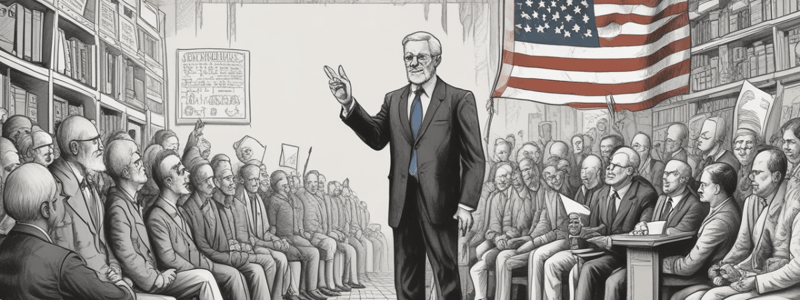Podcast
Questions and Answers
What is the focus of the institutional approach in comparative politics?
What is the focus of the institutional approach in comparative politics?
- The examination of international relations
- The study of individual leaders
- The analysis of power structures and institutions (correct)
- The role of ideas in shaping political outcomes
What is the primary concern of the interest-based approach in comparative politics?
What is the primary concern of the interest-based approach in comparative politics?
- The interests and preferences of groups and individuals (correct)
- The distribution of power among individuals
- The role of institutions in shaping policy
- The impact of international factors on domestic politics
What is the primary focus of the idea-based approach in comparative politics?
What is the primary focus of the idea-based approach in comparative politics?
- The impact of international factors on domestic politics
- The distribution of power among individuals
- The role of institutions in shaping policy
- The ideas and beliefs that shape political outcomes (correct)
What is the primary focus of the individual-based approach in comparative politics?
What is the primary focus of the individual-based approach in comparative politics?
What is the primary concern of the international environment approach in comparative politics?
What is the primary concern of the international environment approach in comparative politics?
What is the primary focus of comparative politics as a field of study?
What is the primary focus of comparative politics as a field of study?
What is the definition of comparative political institutions?
What is the definition of comparative political institutions?
Who defined politics as 'what makes a decision authoritative'?
Who defined politics as 'what makes a decision authoritative'?
What is the primary focus of comparative politics?
What is the primary focus of comparative politics?
What is the objective of studying comparative politics?
What is the objective of studying comparative politics?
Which of the following is NOT a theoretical approach in comparative politics?
Which of the following is NOT a theoretical approach in comparative politics?
What is the primary concern of political theory in comparative politics?
What is the primary concern of political theory in comparative politics?
What is the primary focus of the course Comparative Political Institutions?
What is the primary focus of the course Comparative Political Institutions?
What is the main goal of the theoretical approaches in comparative political institutions?
What is the main goal of the theoretical approaches in comparative political institutions?
What is the term used to describe the study of political institutions across different countries?
What is the term used to describe the study of political institutions across different countries?
What is the main difference between qualitative and quantitative approaches in comparative political institutions?
What is the main difference between qualitative and quantitative approaches in comparative political institutions?
What is the concept of 'democrac(ies)' referring to in the context of comparative political institutions?
What is the concept of 'democrac(ies)' referring to in the context of comparative political institutions?
What is the term used to describe the process of comparing political institutions across different countries?
What is the term used to describe the process of comparing political institutions across different countries?
What is the term used to describe the study of political institutions across different countries?
What is the term used to describe the study of political institutions across different countries?
Which approach focuses on the distribution of power and resources in a society?
Which approach focuses on the distribution of power and resources in a society?
What is the primary concern of comparative politics as a field of study?
What is the primary concern of comparative politics as a field of study?
Which theoretical approach focuses on the role of influential individuals in shaping political outcomes?
Which theoretical approach focuses on the role of influential individuals in shaping political outcomes?
What is the primary objective of studying comparative politics?
What is the primary objective of studying comparative politics?
Which theoretical approach focuses on the international context in which political institutions operate?
Which theoretical approach focuses on the international context in which political institutions operate?
What is the main objective of studying comparative politics?
What is the main objective of studying comparative politics?
Who is credited with the definition of politics as 'what makes a decision authoritative'?
Who is credited with the definition of politics as 'what makes a decision authoritative'?
What is the primary focus of comparative politics as a field of study?
What is the primary focus of comparative politics as a field of study?
What is the definition of power, according to Max Weber?
What is the definition of power, according to Max Weber?
Which of the following is a characteristic of comparative politics?
Which of the following is a characteristic of comparative politics?
What is the purpose of comparative politics in understanding political institutions?
What is the purpose of comparative politics in understanding political institutions?
Who is credited with the definition of politics as 'what makes a decision authoritative'?
Who is credited with the definition of politics as 'what makes a decision authoritative'?
Which of the following scholars is associated with the concept of power in the context of comparative politics?
Which of the following scholars is associated with the concept of power in the context of comparative politics?
What is the primary focus of political theory in comparative politics?
What is the primary focus of political theory in comparative politics?
Which of the following scholars is associated with the development of comparative politics as a field of study?
Which of the following scholars is associated with the development of comparative politics as a field of study?
What is the primary objective of studying comparative politics?
What is the primary objective of studying comparative politics?
Which of the following is NOT a characteristic of comparative politics?
Which of the following is NOT a characteristic of comparative politics?
Which theoretical approach prioritizes the role of individual leaders and their personalities in shaping political outcomes?
Which theoretical approach prioritizes the role of individual leaders and their personalities in shaping political outcomes?
Which of the following theoretical approaches is most closely associated with the concept of power distribution and resource allocation?
Which of the following theoretical approaches is most closely associated with the concept of power distribution and resource allocation?
What is the primary distinction between the institutional approach and the idea-based approach in comparative politics?
What is the primary distinction between the institutional approach and the idea-based approach in comparative politics?
What is the primary similarity between the institutional approach and the international environment approach in comparative politics?
What is the primary similarity between the institutional approach and the international environment approach in comparative politics?
Which of the following theoretical approaches is most closely associated with the concept of behavioral revolution in comparative politics?
Which of the following theoretical approaches is most closely associated with the concept of behavioral revolution in comparative politics?
Which theoretical approach is most concerned with the study of political institutions and their impact on political outcomes?
Which theoretical approach is most concerned with the study of political institutions and their impact on political outcomes?
What is the main idea behind Maurice Duverger's laws?
What is the main idea behind Maurice Duverger's laws?
Who is credited with the idea that 'the newspapers are regarded by democrats as a panacea for their own defects'?
Who is credited with the idea that 'the newspapers are regarded by democrats as a panacea for their own defects'?
When was the École Libre des Sciences Politiques established in France?
When was the École Libre des Sciences Politiques established in France?
What is the term used to describe the theory that every organization eventually ends up in an oligarchy?
What is the term used to describe the theory that every organization eventually ends up in an oligarchy?
What is the name of the survey that is similar to an experiment in Europe?
What is the name of the survey that is similar to an experiment in Europe?
What is the name of the period of change in the study of comparative politics that occurred in the mid-20th century?
What is the name of the period of change in the study of comparative politics that occurred in the mid-20th century?
Study Notes
Comparative Politics: Definition and Approaches
Comparative politics is a subfield of political science that compares and analyzes political institutions, actors, and processes across different countries and contexts.
It aims to understand what makes two institutions similar or different, how the relationship between states is structured, and provide a normative conception of reality.
Theoretical Approaches to Comparative Politics
- Institutional approach: focuses on the role of institutions in shaping political outcomes and behavior.
- Interests approach: emphasizes the role of interests, such as groups, parties, and ideologies, in shaping political outcomes.
- Ideas approach: highlights the role of ideas, beliefs, and values in shaping political outcomes.
- Individuals approach: focuses on the role of individual leaders, politicians, and citizens in shaping political outcomes.
- International environment approach: examines the impact of the international environment on domestic political outcomes.
Comparative Politics: What For?
- Describe cases: classification and typologies of institutions and actors.
- Explain: formulate hypotheses, test them, and make statements about them.
- Examples of research questions:
- Why are radical-right parties successful in some countries but not in others?
- Why is turnout higher in some countries than in others?
- Why is the welfare state more generous in some countries than in others?
- Why do some authoritarian regimes turn into democracies while others do not?
Key Concepts and Theorists
- Power: defined by Max Weber as the ability to impose one's will on others.
- Authority: defined by Aristotle as the ability to make decisions that are accepted as legitimate.
- Iron Law of Oligarchy: every organization eventually ends up in an oligarchy (Roberto Michels, 1876-1936).
- Duverger's Laws: the simple-majority single-ballot system favors a two-party system, while the simple-majority system with second ballot and proportional representation favor multipartism (Maurice Duverger, 1917-2014).
History of Comparative Politics
- The first separate school of political science was established in 1872 in France as the École Libre des Sciences Politiques (now the Institut d'Études Politiques).
- The behavioral revolution marked a significant shift in the field of comparative politics, emphasizing the use of scientific methods and empirical evidence to study political phenomena.
Notable Scholars
- Walter Lippmann (1899-1974): known for his work on public opinion and the role of media in shaping political outcomes.
- Gramsci, Habermas, Schmitt, Sartori, Mair, Lijphart, Gilpin, Waltz, and Mershaimer: notable scholars in the field of comparative politics.
Studying That Suits You
Use AI to generate personalized quizzes and flashcards to suit your learning preferences.
Related Documents
Description
Explore the different theoretical approaches to understanding comparative politics, including institutional, interests, and ideas-based perspectives.




